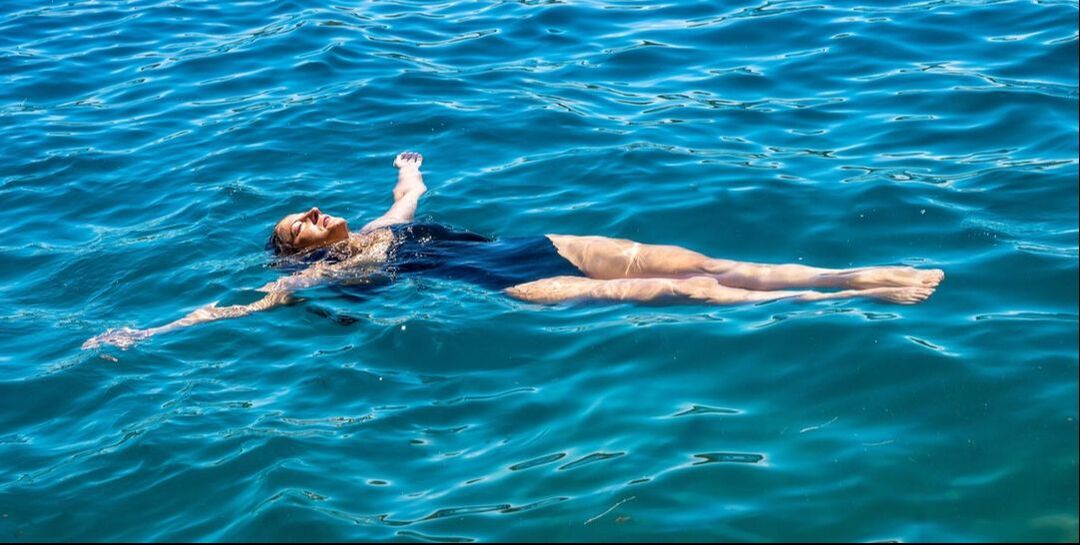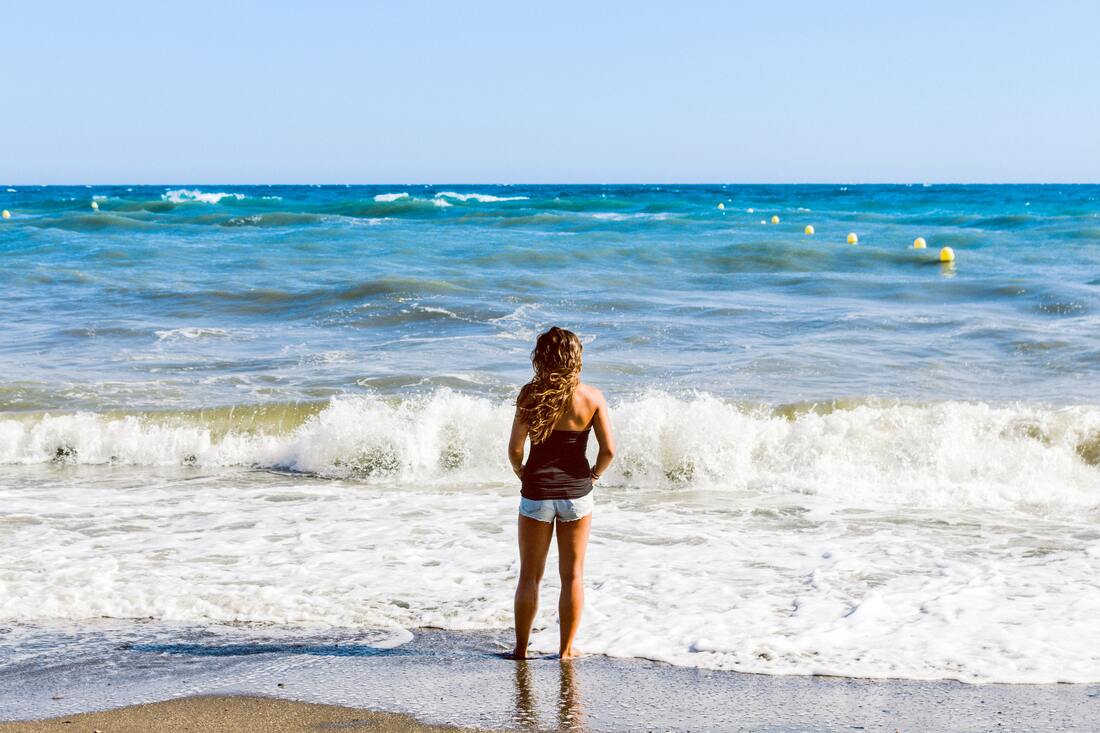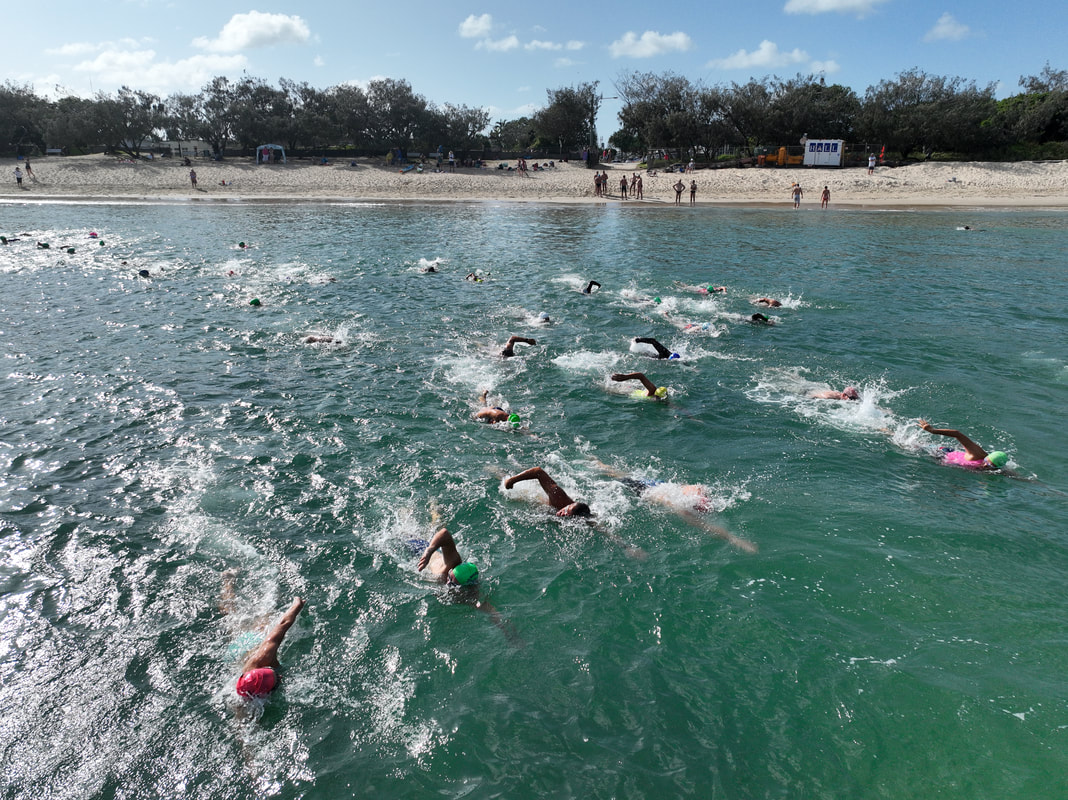|
There is a lot of talk these days about the concept of "blue health". It's a relatively new term but one which almost every ocean swimmer can relate to, even if they are not familiar with the phrase. So what, exactly, is blue health anyway?
The science of blue health explores the relationship between exposure to aquatic environments—such as oceans, lakes, rivers, and even urban water features — and the impact on human health and well-being. This interdisciplinary field combines elements of environmental science, psychology, public health, and other disciplines to understand how interactions with blue spaces can influence physical and especially mental health. The upshot is that unless you have experienced some kind of trauma in or near water, the benefits of blue health are overwhelmingly positive. At it's core blue health aligns with the concept of biophilia, which suggests that humans have an inherent connection to nature. Water, as a fundamental element of the natural environment, plays a crucial role in fostering this connection. If you want to take this idea further, it is suggested that this deep human connection to water is related to our time in the womb and the calmness and safety we experienced there. Some researchers suggest this affinity with water is even more profound, dating back to evolutionary times when all life existed in the ocean. Research has shown that exposure to blue spaces promotes a sense of connection to nature and overall well-being. This can be as simple as looking at water, sitting, standing or walking close to it, or, as we do, immersing yourself in it. Studies have shown people experience a reduction in stress levels, including those who suffer from anxiety or depression. The "blue mind" hypothesis suggests that being in or near water promotes mental clarity, creativity, and an overall sense of well-being. When asked to describe how water makes people feel, words like calm, tranquil, still and content are consistently used. As ocean swimmers we have all experienced the cozy feeling of wellbeing at the end of a swim, even if it's just a short splash in the sea. It's hard to describe why we feel so good, but it is a shared experience we all know and love. Blue health also extends beyond individual well-being to include social and community engagement. Waterfront areas often serve as gathering places for recreational activities and community events. Access to blue spaces encourages social interactions, community engagement, and a sense of belonging. As we all know, the after swim coffee and chat is as important as the swim, which backs up this point. Finally there is also the physical benefits to blue health - whether you are walking, jogging or swimming in or near water, you are also improving your physical fitness in addition to the mental health benefits.
1 Comment
As any ocean swimmer can tell you, swimming in the ocean makes you feel good! No matter how your mood or motivation is when you go in, you are almost guaranteed to feel better when you get out. Although it's not entirely clear why this happens, there are some good theories about what makes ocean swimming such a pleasing experience.
Probably the most obvious idea relates to the ocean being a natural environment, and most people find being in nature calming and rejuvenating. The sound of the waves, the salty smell of the sea air, and the sensation of water against your skin can all contribute to a sense of relaxation and well-being. The vastness of the ocean can evoke feelings of awe and wonder, especially if you see turtles, dolphins, stingrays or any other (friendly) ocean wildlife. When you add in Vitamin D exposure, which is believed to boost mood and well-being, you have a perfect storm of natural influences working in your favour. Swimming in the ocean also engages multiple senses simultaneously. You can feel the water on your skin, hear the soothing sounds of the waves, and see the vast expanse of water and sky. This sensory experience can be deeply pleasurable and immersive. For those who enjoy colder water immersion, this can further evoke your senses and there is research to suggest that colder water can also improve general mood and well being as well as decreasing anxiety and depression. Saltwater has traditionally been known to have therapeutic effects, natural healing properties and is believed to be good for your skin and respiratory system. Ocean swimming also offers a sense of adventure and exploration. Whether you are staying close to shore or going further out and navigating waves and swell, or swimming around headlands or across reefs, this unpredictability and excitement of pushing your boundaries can be exhilarating and positively challenging. Also swimming in the ocean means you have to step out of your daily life for a short period and leave behind your phone and connection to your work day or regular routine. This is always a great circuit break and allows you to unwind and recharge, knowing you are out of reach of everyday life for just a while. Many ocean swimmers find the experience to be very meditative as they focus on breathing and sighting where they are headed to. Needing to have an awareness of your environment focuses your senses only on what you are doing, rather than being distracted by the many thoughts that can clutter your mind when on land and going about your everyday life. Finally, there is the all important sense of community. Swimming in the ocean can be a social activity if you swim with friends or in a group. Whether it's sharing the fun of the waves, spotting dolphins or stopping to chat at the halfway point, swimming in a group improves the experience considerably. This generally extends to a post swim conversation and/or coffee, which most would agree is as enjoyable as the swim. Ocean swimming groups are generally an eclectic mix of people who you might not normally meet or socialise with in your everyday life. Such friendships, based on a common interest, can be enriching and broaden your horizons in a way your other friendship may not. Many aspiring ocean swimmers love the idea of heading out beyond the breakers to enjoy all the ocean has to offer but never seem to make it into the water. They may watch ocean swimmers from the shore, study websites about the sport and even join a local Facebook group that hosts regular swims but still hang back, never quite ready to commit. Feeling anxious before your first ocean swim is completely understandable, especially if you are not somebody who has spent much time at the beach. The ocean can be intimidating due to waves, currents, tides and other potential hazards but if you are serious about giving ocean swimming a go, you need to find a way to work through this anxiety. The best way is to make a plan and progress through some stepping stones to prepare yourself before taking that final leap of faith.
The first and most obvious step is to get pool fit with your swimming. This is the absolute baseline for being a successful ocean swimmer (see this article) and can be undertaken in a safe, controlled environment. Work on any flaws in your technique as well as building your fitness and your confidence will grow dramatically. People have different ocean swimming goals in terms of how far they want to be able to swim, but the minimum you should aim for is to be able to comfortably swim one kilometre (just over half a mile) in the pool non-stop. You do not need to be a fast swimmer, but your strokes and breathing should be confident. If you commit to this several times a week, it does not need to take a long time to achieve. If you need some stroke correction first, it is a worthy investment and, again, does not need to take a long time if you are committed. The next thing you can work on is understanding the beach you plan to swim at. You don’t need to go in the water to work on this. Use the internet to research or talk to the lifeguards who work at the beach to find out things like the water temperature, tides, currents and how the wind impacts that particular stretch of coastline. If it is a beach with a strong fixed rip and a reef that creates a heavy, dumping shore break, it might not be the best option for a novice. On the other hand, if it is a generally calm beach that is sheltered from the worst of the wind, you know you are looking at a good starting point. Walk along the beach and become familiar with it as this will help you when you venture into the water. When you are ready for your first swim, remember the golden rule – never swim alone in open water. Either find a buddy who is a confident swimmer or join a swimming group. If you feel you want to build up some confidence before attempting a group swim, try some practice swims close to shore. Choose a sheltered area, if you can, with minimal wave action, where you can still touch the bottom. Also, go on a calm day. Do some short swims back and forth, or if the sheltered area is long enough, go a bit further. Use a swim float for extra security or wear flippers until you feel more confident. It is also a very good idea to wear a bright coloured swim cap and possibly a bright rash vest as this makes you much more visible. Almost all open water swimmers wear goggles as well. This is a personal choice but for much better visibility they are a great idea. You can get tinted or polarized lenses to reduce glare. If you are joining a swimming group, firstly make sure you choose a relatively calm day for your first swim. This can be frustrating if the weather does not cooperate with your schedule but for your own safety it is necessary to be patient. Take a buddy if you can and make sure you are there early to talk to other swimmers. Explain that it is your first swim and you are feeling a bit anxious. Find out any tips about the course and what to expect. Chances are they will have someone swim with you or at least keep a check on you. This is not always the case, though, so be prepared that you need to be responsible for your own safety. This is where a swim float can be a very good safety device. You might consider going only part way for your first few swims until you build up your confidence. If part of your anxiety about ocean swimming is navigating waves, rips and currents, consider doing a course that teaches you how to navigate these things. It is amazing how much you can learn over the space of a few hours with an expert coach to help you. Understanding how waves and rips work also reduces the fear they can induce. There are many of these courses available at different beaches. Two well known programs on the east coast of Australia are run by OceanFit and Phil Clayton (click on the names for websites). Ultimately, if you want to become an ocean swimmer, you do just have to take the plunge at some point. However, as outlined above, preparing yourself is the best way to overcome anxiety. Creating a step by step list will give you something solid to work towards and build confidence at each step. Check out your local ocean swimming groups, familiarise yourself with where they swim and be patient but committed as you gradually work towards your first ocean swim. Ocean swimming has become increasingly popular over the last few years, especially after Covid pool closures sent many pool swimmers into open water in order to keep up their swimming. More and more people are keen to give it a go, including some who do not have much pool fitness. As much as you might want to skip the pool (and the chlorine) altogether, it is important to have a solid pool swimming fitness before you head out into the open water. It doesn't mean you have to commit to the pool for life, but it is a necessary stepping stone for a novice open water swimmer.
First of all it is essential that you master fundamental swimming skills such as proper body position, breathing and stroke mechanics. These skills are crucial in any type of swimming, especially ocean swimming. Proper technique will also allow you to swim more efficiently and conserve energy, allowing you to swim further. You don't want to head out the back at Bondi if you are flat out making 25 metres of freestyle or you swim with your head out of the water because you've never learned to breathe properly. Getting your basics right in the controlled environment of the pool will build your confidence much faster than in the unpredictability of the ocean. Remember in a pool you know the depth, the temperature and the distance from end to end. You also have a black line to follow to keep you on track. The pool also presents you with the same conditions every time you go there (unlike the ocean). Pool swimming helps you build endurance and stamina, which are essential for swimming longer distances in the ocean. Ocean conditions can be challenging with waves, currents, and tides, and being a strong pool swimmer can help you handle these conditions more effectively. Having a solid base fitness will stand you in good stead if you end up a long way from shore or get pushed around by waves, both of which can sap your energy quickly. Knowing in your head that you are capable of swimming one or two kilometres can remove the anxiety of a long swim back to shore should you unwittingly end up further out than you planned. Swimming in the pool allows you to mix up your routine and include sprints, distance, short rest and other training techniques that build your aerobic and anaerobic fitness, both of which are essential for ocean swimming. Anaerobic fitness will get your through a set of big waves without panic and aerobic fitness will get you out around the buoys on longer swims. Short rest training will make you comfortable having a quick rest en route, knowing you can pick up again and keep going. Being a strong pool swimmer will also help you with the psychology of ocean swimming. Knowing you are fit and confident is the baseline for heading out into open water as you can never be sure what you might encounter on any given day. Being worried that you can't breathe on one side or can only do breaststroke will induce a level of anxiety that will ruin your open water swimming experience. If you feel overwhelmed at the idea of doing laps and aren't really sure how to go about it you could join an adult squad or make use of a set program to give you some guidance. Get Swimming (www.getswimming.com.au) has a Couch to 1K program if you are a real beginner, or, also has 10 Pack program sessions for 1, 1.5 and 2 km sessions that you can use to improve your pool swimming. In summary, being a confident pool swimmer is an essential prerequisite for becoming a successful ocean swimmer. The skills, stamina, and confidence developed in the pool provide a strong foundation for tackling the unique challenges of open water swimming. Once you have reached a good level of fitness, a regular pool session will hold you in good stead even if you do most of your swimming out in the ocean. |
|
|
Disclaimer: Mooloolaba Spit Ocean Swimmers is a social swimming group that swims across Mooloolaba Bay. We do not provide water safety and it is up to each swimmer to determine on any given day whether or not they are able to complete the swim (approx 850 m each way). Ocean swimming can be a hazardous activity and is undertaken by each individual at their own risk.
|





